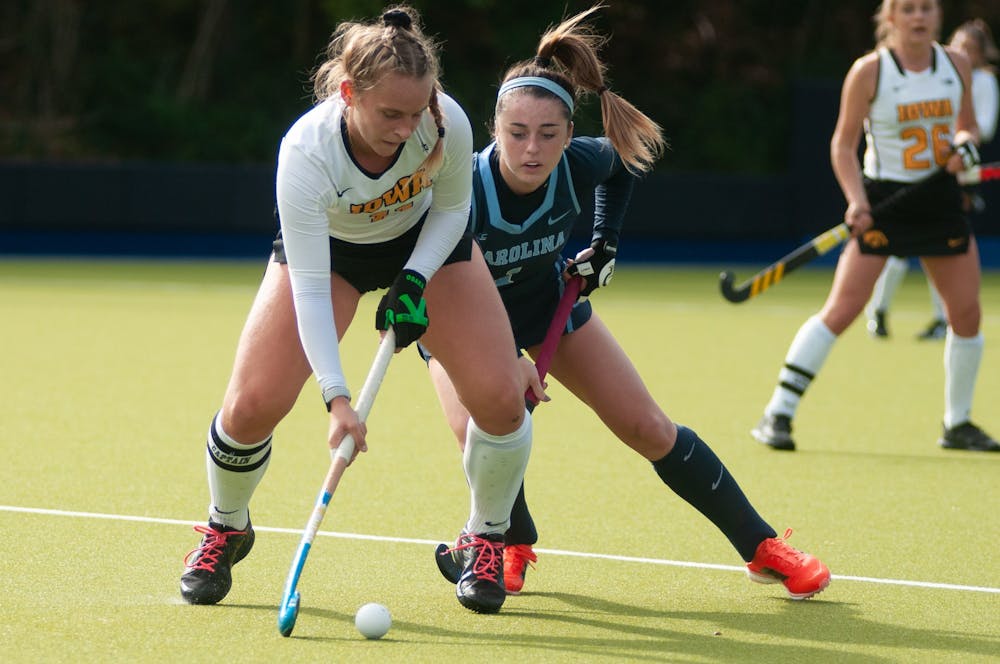“I don’t have to worry about that with them,” he said. “Honestly, sometimes my biggest concern is that they’re gonna do too much and overtrain themselves.”
“It makes my job easier because that sometimes can be the hardest part,” Ayscue continued. “A lot of it is mental, and having the right mindset. With these girls, that’s never really an issue.”
The state of things, however, has forced Ayscue to be flexible. Using an app called Teamworks, he regularly sends the team different documents with strength and conditioning routines. All workouts are optional, per the NCAA, and must be attuned to the resources each player has at her disposal.
“We’re having to get a little more creative,” Ayscue said. “Especially for the girls who don’t really have much access to anything equipment-related.”
It’s similar to the summertime, when players might be out of town without workout gear or access to a field hockey turf. Ayscue sends the team demonstration videos of different exercises via text, constantly trying to keep things fresh.
“If it’s not the same old stuff that they’re used to,” he said, “they’re a little more inclined, especially when they’re on their own, to jump into it.”
Still, there are problems. Ayscue can’t be there in person to give players pep talks or correct their technique on an exercise. Live Zoom sessions, he says, would be largely pointless, as he’s just one set of eyes and can only see so much. And everyday conditioning is different from field hockey conditioning: there’s an added emphasis on keeping your hips low, as one would in a game, and being able to change directions quickly.
Still, Ayscue isn’t worried. A hands-off approach, more often than not, gets the job done.
“They’re a really internally driven bunch,” he said. “They’re pretty good at holding each other accountable, and they’re a pretty close-knit group.”
'They want to do it again'
Matson says she’s tried to keep as normal of a schedule as possible, given the circumstances. Class in the morning, workouts in the afternoon. Throughout the day, she checks in via the team’s group chains over text and Snapchat. Later at night, maybe it’s having dinner with teammates via Zoom or hopping on FaceTime.
“I think we’re gonna start doing some of those Netflix watch parties, where we can all chat while watching a movie,” she said.
To get the day's news and headlines in your inbox each morning, sign up for our email newsletters.
“As a team, we’re so close,” she added. “So being separated like this is really foreign for us.”
The rest of the team is trying to stick to a routine, too. On Wednesday, the Tar Heels had their first virtual film session, with clips of themselves from last season and international teams. How do you improve on perfection? Let Head Coach Karen Shelton count the ways: the young backfield needs to improve its ball speed, players have to reposition more urgently and how will they replace a loss of experience in the front line?
“They’re realistic,” Shelton said of her squad. “I don’t think it’s a cocky group. They did win, but I think they’re realistic about where they are and where they need to go to get better.”
The team also holds sports psychology meetings, largely run by its four-member “leadership group,” Courtnie Williamson, Eva Smolenaars, Amanda Hendry and Matson, to ensure everyone’s in a good headspace: “Just making sure everyone’s happy right now, because it is weird for everybody,” Matson said.
Those four act as the go-betweens for the rest of the players and the coaching staff. Shelton looks to that group — especially Matson — to be the coaches on the field and a source of guidance off of it.
“She commands such great respect because she’s such a good player,” Shelton said. “She’s earned that ability by working hard and being as good as she is. As a coach, you’re just so proud and thankful you have a leader like this, that doesn’t just sit back and know that they’re the best player on the team, but that she’s actually working on things that she can do to improve herself.”
Ayscue surmised that Matson, the two-time ACC Offensive Player of the Year, is the best field hockey player in the country and one of the best in the world. She’s also been the one leading the charge in the offseason, becoming more vocal, her coach says, and holding teammates accountable when it comes to those offseason workouts.
“We would expect the kids to prepare themselves to the best of their ability,” Shelton said. “The best will do it. The others will look for excuses.”
Matson may be bored at home like the rest of us, and she may be picking up hobbies like she’s at a summer art camp. But those in the program say she hasn’t forgotten where her priorities lie. Neither have her teammates.
“They can appreciate what we did last year, and they’re thankful,” Shelton said. “But I think they want to do it again. You get hungry for that. You want to keep winning.”
@ryantwilcox
@DTHSports | sports@dailytarheel.com




